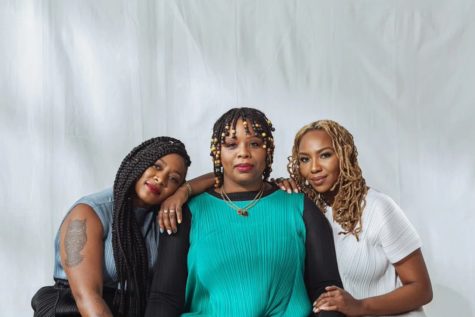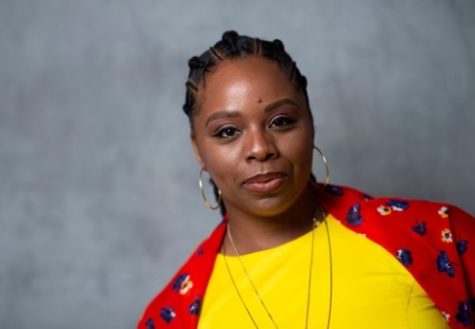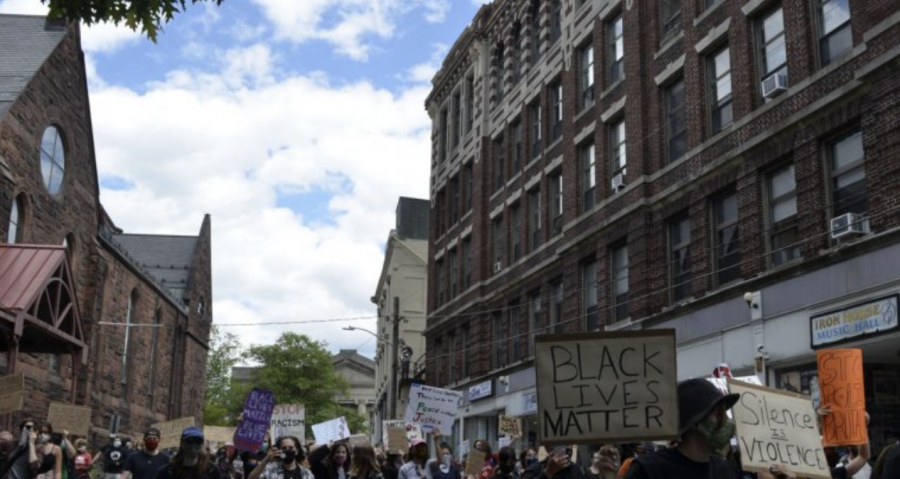In 2020, following the May 25 police killing of George Floyd, millions of people across the country joined Black Lives Matter protests in what the New York Times named the largest movement in United States history. Co-founder of the Black Lives Matter movement Patrisse Cullors spoke at UMass on Thursday, March 11 about the movement, her life and everything in-between. In an open conversation hosted by the University Programming Council and moderated by junior biomedical engineering major Rebecca Louisthelmy, Cullors discussed anything from her experiences of discrimination as a child, to her favorite on-the-go snack: cashews.
In addition to co-founding the Black Lives Matter movement, Cullors is an author, producer, educator, artist and prison abolitionist. Her book “When They Call You A Terrorist: A Black Lives Matter Memoir” is a New York Times bestseller. She has led multiple Los Angeles-based organizations, such as Dignity and Power Now, Justice LA and Reform LA Jails. The Black Lives Matter movement, alongside Cullors as co-founder, was nominated for the 2021 Nobel Peace Prize.
Black Lives Matter started in 2013 following the fatal shooting of Trevon Martin, and was founded by three Black women, Alicia Garza, Patrisse Cullors and Opal Tometi. The catalyst for the movement was the acquittal of George Zimmerman, the white vigilante who followed and shot 17-year-old Martin as he walked home from buying skittles at a 7-eleven. Garza first used the term in a written response to the acquittal on Facebook, which she called “a love letter to Black people.” Cullors turned the phrase into a hashtag in the comments, and Tometi offered to help build platforms for the new movement. At Thursday’s event, Cullors said that the movement was really started by “hundreds of Black people who were tired of witnessing Black death and nobody doing anything about it.”

“What we realized was that it was Trevon on trial, not George Zimmerman. And when George Zimmerman was acquitted of the murder, I personally was fed up. I was tired, I was angry, I was frustrated. I didn’t understand how this could happen again,” Cullors recalled.
“The first fight was to get him re-arrested, to get some accountability for the family. I remember Trevon’s mom [Sybrina Fulton] being out in the world and asking the country to stand up for her child, to stand up for her son,” Cullors said. “That was really powerful for us, I didn’t want Sybrina to feel alone. I didn’t want George Zimmerman to have the period to the end of the story, and Black Lives Matter emerges from that rage, grief and love for Black people. It’s out of a love for Black people that Black Lives Matter emerges.”
Cullors traced the movements ongoing growth through the 2014 murder of Black teenager Michael Brown in Ferguson Missouri and the ensuing Ferguson Uprising, to the numerous murders and deaths of Black people at the hands of the police and vigilantes in the years since.
“What you start to see is a growing movement to challenge state violence in this country. One thing I think is important … is our movement didn’t happen out of thin air,” Cullors added. “Our movement is part of a long legacy of other Black liberation movements that have been happening for the past 400 years. Our movement is both connected to the history of Black liberation in this country, but also Black liberation across the world.”
When asked about the initial response to the movement, as it spread through the online hashtag #BlackLivesMatter, and the first steps she took, Cullors said the response was mixed. She said the movement faced a counter movement around the phrase “all lives matter,” as well as some people using the presence of the first Black president to argue against the use of the word “Black” in the movement’s name.
“There’s always been contention. At the beginning, when you start something, people are going to feel a-ways about it. But over the years, Black Lives Matter became a point of purpose, [it] became a vision, a light, a guiding source, a rallying cry and it became a movement,” Cullors said.

Cullors said that the movement’s “ultimate goal is the freedom of Black people,” and that it is also a global fight for “every human being that exists.” When asked if she has seen any change in society after the growth of the Black Lives Matter movement, Cullors said that change is slow, but she has faith that it will come.
“Even if something isn’t good for us and we’ve been doing it for a long time we’ll keep doing it anyways. That’s how we’re wired as human beings … we have 400 years of being used to white supremacy violence, 400 years of racism and homophobia and sexism and patriarchy and capitalism, so to undo that in our bodies and institutions is very hard,” Cullors said. “What I do believe is that it will change, it can change, and it must change, for us, for the livelihood and for the survival of humanity. This fight, when we say Black Lives Matter, it’s not just a fight for Black people, it’s a planet fight, a fight for every human being that exists.”
Cullors said that her experiences growing up in Los Angeles contributed to her decision to start the movement. While she witnessed “utter neglect” in her direct neighborhood, she had the experience of going to school in a different, predominantly white neighborhood. She said this experience exposed her to harsh inequality and showed her a “different world.”
“Where my neighborhood the police were circling the block every hour on the hour, just a few miles down there were no police,” Cullors recalled. “When you’re not over policed and not being stalked as a suspicious person … I did see the difference and I think it’s why I ended up doing the work I do, because I saw a different world, and then I went back to my world. So I lived in two extremely different worlds with two different kinds of people, all human beings, but one community was being criminalized and punished, and the other community was being praised and loved on, and resourced.”
When asked about other instances of discrimination she experienced as a child, Cullors said it “happened all the time.” She described one instance when police handcuffed and took her brother into custody without explanation while he was walking her to a friend’s house when she was 13 and her brother was 16.
“All of your rights being violated all the time, you start to forget what rights you have,” she said.
For other people hoping to follow in her footsteps, Cullors said “follow in your own footsteps,” but that if someone insists on following in her footsteps, to not stick to one “form,” but to instead allow oneself to be multiple things. Cullors herself is an activist and an artist.
In regard to the killing of George Floyd, which set off mass Black Lives Matter protests against police brutality, Cullors said, “there’s something about Black people dying on camera for the world to see that’s deeply, deeply disturbing.” She added that there is a feeling that “no one will see [Black people’s] trauma and pain unless it’s recorded.”
“No other group of people has to deal with that… the constant humiliation of that kind of the death on film, and then the rest of the world watching it,” she said, reflecting on the past summer. “It’s not going to end until we end white supremacy, until we have Black power, until Black lives actually matter… I don’t think we should have to keep publicizing Black death in order to ask for our lives. I think there should be a moment when we say we’re not going to do this anymore, I always think of the families… I don’t have the answer to this, I just have a lot of questions about how we get there together.”
She noted that allyship has been integral to the movement since its beginning, and that she believes in the George Floyd protests, the country witnessed “allyship in action in a mass way.”
When asked what she wants to change, and what rules and regulations specifically she wants to see altered, she pointed to The Breathe Act, which seeks to transfer money from police budgets into other community safety programs, and the overall movement to defund the police. She encouraged people to visit the Defund the Police website to learn more about the defund movement and progress.
Cullors said that out of everything she has done, her art gives her the most purpose, and that in her personal life, having a child changed everything for her. She said, “having a child puts it into perspective.” At the end of the event, Louisthelmy asked Cullors a number of open-ended questions, such as her favorite coffee – she prefers tea, specifically dandelion tea – and her favorite Netflix show – she just finished watching “The World’s Most Extraordinary Homes” with her son. When Louisthelmy asked for everyday ways that young people can make themselves a stronger activist, Cullors advised her to, “Keep up with the news and join an organization based off of the things you love and care about.”
Claire Healy can be reached at [email protected]. Follow her on Twitter @clurhealy.



















